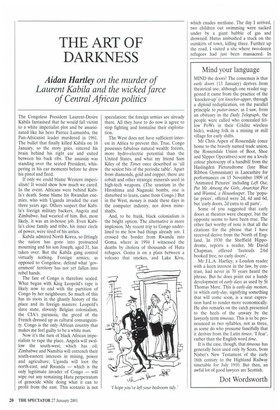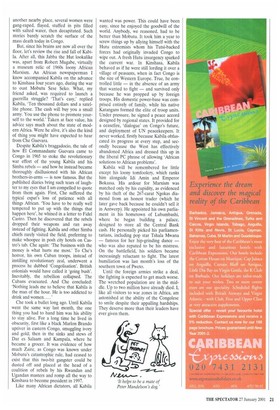THE ART OF DARKNESS
Aidan Hartley on the murder of
Laurent Kabila and the wicked farce of Central African politics
The Congolese President Laurent-Desire Kabila fantasised that he would fall victim to a white imperialist plot and be assassinated like his hero Patrice Lumumba, the Pan-Africanist leader murdered in 1961. The bullet that finally killed Kabila on 16 January, so the story goes, entered his brain behind his right ear and exited between his back ribs. The assassin was standing over the seated President, whispering in his ear moments before he drew his pistol and fired.
If only we could blame Western imperialism! It would show how much we cared. In the event, Africans were behind ICabila's death. Some blame his Rwandan enemies, who with Uganda invaded the east three years ago. Others suspect that Kabila's foreign military backers, Angola and Zimbabwe, had wearied of him. But, most likely, it was an in-house job. Even Kabila's close family and tribe, his inner circle of power, were tired of his antics.
Kabila admired North Korea, so fittingly the nation has gone into protracted mourning and his son Joseph, aged 31, has taken over. But the Kabila gang control virtually nothing. Foreign armies, as opposed to Congolese, defend what 'government' territory has not yet fallen into rebel hands.
The fate of Congo is therefore sealed. What began with King Leopold's rape is likely now to end with the partition of Congo by her neighbours. So much of this has its roots in the ghastly history of the place and its foreign masters: Leopold's slave state, slovenly Belgian colonialism, the CIA's paranoia, the greed of the French dressed up as cultural consanguinity. Congo is the only African country that makes me feel guilty to be a white man.
Now it's the turn of black African imperialists to rape the place. Angola will swallow the south-west, which has oil; Zimbabwe and Namibia will entrench their south-eastern interests in mining, power and agriculture; Uganda will loot the north-east: and Rwanda — which is the only legitimate invader of Congo — will wipe out any remaining Hutu perpetrators of genocide while doing what it can to profit from the east. This scenario is not speculation: the foreign armies are already there. All they have to do now is agree to stop fighting and formalise their exploitation.
The West does not have sufficient interest in Africa to prevent this. True, Congo possesses fabulous natural wealth: forests, more hydro-electric potential than the United States, and what my friend Sam Kiley of the Times once described as 'all the sexiest bits of the periodic table'. Apart from diamonds, gold and copper, there are cobalt and other strategic minerals used in high-tech weapons. (The uranium in the Hiroshima and Nagasaki bombs, one is disturbed to learn, came from Congo.) But in the West, money is made these days in the computer industry, not down mineshafts.
And, to be frank, black colonialism is the bright option. The alternative is more implosion. My recent trip to Congo underlined to me how bad things already are. I crossed the border from Rwanda into Goma, where in 1994 I witnessed the deaths by cholera of thousands of Hutu refugees. Goma is on a plain between a volcano that smokes, and Lake Kivu, which exudes methane. The day I arrived, two children out swimming were sucked under by a giant bubble of gas and drowned. Hutus ambushed a truck on the outskirts of town, killing three. Further up the road, I visited a site where two-dozen refugees had just been massacred. In another nearby place, several women were gang-raped, flayed, stuffed in pits filled with salted water, then decapitated. Such stories barely scratch the surface of the mass death today in Congo.
But, since his brains are now all over the floor, let's review the rise and fall of Kabila. After all, this Jabba the Hut lookalike was, apart from Robert Mugabe, virtually a museum relic of 1960s loony African Marxism. An African newspaperman I know accompanied Kabila on the advance to Kinshasa four years ago, during the war to oust Mobutu Sese Seko. What, my friend asked, was required to launch a guerrilla struggle? 'That's easy,' replied Kabila, 'Ten thousand dollars and a satellite phone. The cash will buy you a small army. You use the phone to promote yourself to the world.' Taken at face value, his advice says much about the state of modern Africa. Were he alive, it's also the kind of thing you might have expected to hear from Che Guevara.
Despite Kabila's braggadocio, the tale of how El Commandante Guevara came to Congo in 1965 to stoke the revolutionary war effort of the young Kabila and his Simba rebels — and how he instead became thoroughly disillusioned with his African brothers-in-arms — is now famous. But the published diaries bring such tears of laughter to my eyes that I am compelled to quote from them again. First, Che suffered the typical expat's loss of patience with all things African. 'You have to be really well tempered to put up with the things that happen here', he whined in a letter to Fidel Castro. Then he discovered that the rebels dropped their weapons and ran away instead of fighting. Kabila and other Sirnba chiefs rarely visited the field, preferring to make whoopee in posh city hotels on Castro's tab. Che again: 'The business with the money is what hurts me most.' To Che's horror, his own Cuban troops, instead of instilling revolutionary zeal, underwent a process he dubbed 'Congolisation'. British colonials would have called it 'going bush'. Inevitably, the rebellion collapsed. The Cubans evacuated. And Che concluded: 'Nothing leads me to believe that Kabila is the man of the hour. He is too addicted to drink and women,...'
Che took a bullet long ago. Until Kabila went the same way last month, the one thing you had to hand him was his ability to stay alive. For a long time he lived in obscurity, first like a black Marlon Brando upriver in eastern Congo, smuggling ivory and gold; then in the sinks and stews of Dar es Salaam and Kampala, where he became a grocer. It was evidence of how much Zaire, as Congo was known under Mobutu's catastrophic rule, had ceased to exist that this two-bit gangster could be dusted off and placed at the head of a coalition of rebels by his Rwandan and Ugandan masters and romp all the way to Kinshasa to become president in 1997.
Like many African dictators, all Kabila
wanted was power. This could have been easy, since he enjoyed the goodwill of the world. Anybody, we reasoned, had to be better than Mobutu. It took him a year to screw things up by allying himself with the Hutu extremists whom his Tutsi-backed forces had originally invaded Congo to wipe out. A fresh Hutu insurgency sparked the current war. In Kinshasa, Kabila behaved as if he were still lording it over a village of peasants, when in fact Congo is the size of Western Europe. True, he controlled little — in the absence of an army that wanted to fight — and survived only because he was propped up by foreign troops. His domestic power-base was comprised entirely of family, while his native Katangans formed the elite of troop units. Under pressure, he signed a peace accord designed by regional states. It provided for a ceasefire, 'dialogue' on Congo's future, and deployment of UN peacekeepers. It never worked, firstly because Kabila obfuscated its progress at every step, and secondly because the West has effectively abandoned Africa and dressed this up in the liberal PC phrase of allowing 'African solutions to African problems'.
Kabila will be remembered for little except his loony tomfoolery, which ranks him alongside Idi Amin and Emperor Bokassa. His ardour for Marxism was matched only by his cupidity, as evidenced by his theft of the 267-carat Ngokas diamond from an honest trader (which he later gave back because he couldn't sell it in Antwerp). He appointed his own parliament in his hometown of Lubumbashi, where he began building a palace, designed to store all the Central Bank cash. He personally picked his parliamentarians, including pop star Tshala Mwana — famous for her hip-grinding dance — who was also reputed to be his mistress. On the battlefield, his soldiers became increasingly reluctant to fight. The latest humiliation was last month's loss of the southern town of Pweto.
Until the foreign armies strike a deal, the fighting is expected to get much worse. The wretched population are in the middle. Up to two million have already died. I, like all visitors to war zones in Africa, am astonished at the ability of the Congolese to smile despite their appalling hardships. They deserve more than their leaders have ever given them.























































































 Previous page
Previous page